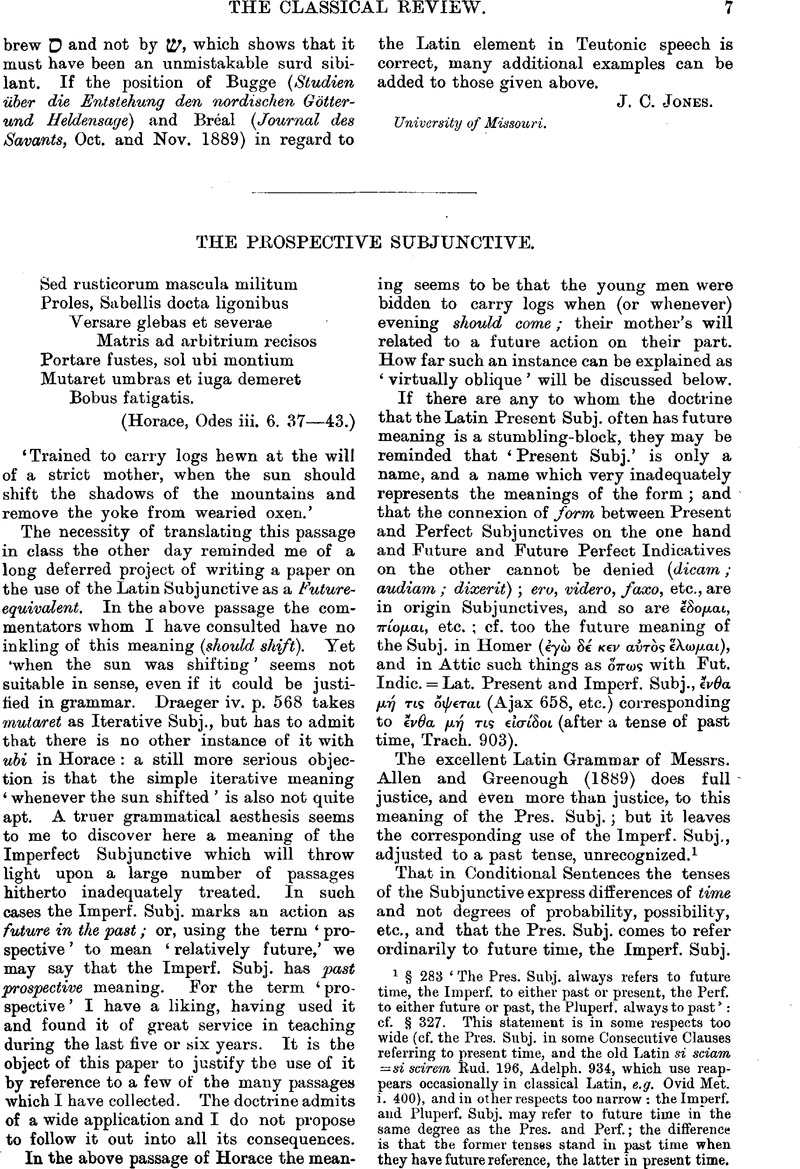No CrossRef data available.
Article contents
The Prospective Subjunctive
Published online by Cambridge University Press: 27 October 2009
Abstract

- Type
- Review Article
- Information
- Copyright
- Copyright © The Classical Association 1893
References
page 7 note 1 § 283 ‘The Pres. Subj. always refers to future time, the Imperf. to either past or present, the Perf. to either future or past, the Pluperf. always to past’: cf. § 327. This statement is in some respects too wide (cf. the Pres. Subj. in some Consecutive Clauses referring to present time, and the old Latin si sciam = si seirem Rud. 196, Adelph. 934, which use reappears occasionally in classical Latin, e.g. Ovid Met. i. 400), and in other respects too narrow: the Imperf. and Pluperf. Subj. may refer to future time in the same degree as the Pres. and Perf.; the difference is that the former tenses stand in past time when they have future reference, the latter in present time.
page 8 note 1 An interesting example to illustrate the Imperf. and Pluperf. Subj. is Cio. Cat. Maior § 19: Num igitur, si ad centesimum annum vixisset, senectutis eum suae paeniteret (present time)? Nec enim excursione nec saltu…uteretur (present time), sed consilio, ratione, sententia. Quae nisi essent (present time) in senibus, non summum concilium maiores nostri appellassent senatum.
page 8 note 2 A distinction is there drawn between cases where the Subj. refers to future time and eases where it refers to present or past time, e.g. si sint ea vera, quid mirum fecit? ‘if that be true,’ Pseud. 433, tibi non erat copia nisi occiperes, Bacch. 563. Such instances are not included below, though they are very often practically indistinguishable from those which I quote: e.g. Juvenal x. 339 ni velis may refer to future or present time.
page 8 note 3 ‘The Indicative merely points out the fact that of two events one succeeds the other in time, while the Subjunctive declares that their succession is willed by a person’—a remark which may be true of the origin of the construction (the Subj. being the mood of ‘willing’ and ‘shalling’) but does not tally with the actual usus loquendi.
page 8 note 4 Cf. my notes on Rudens 179 and 961. ‘Before I answer’ = ‘Before answering’ = ‘Before i shall answer.’
page 8 note 5 Hanssen, Philologischer Anzeiger, vol. xvii.
page 10 note 1 Cf. Carlyle's, Frederick the Great (Ashburton Edition, vol. I., book IV., p. 368)Google Scholar: ‘Friedrich Wilhelm took a newspaper till the job were done,’ i.e. should be done.


